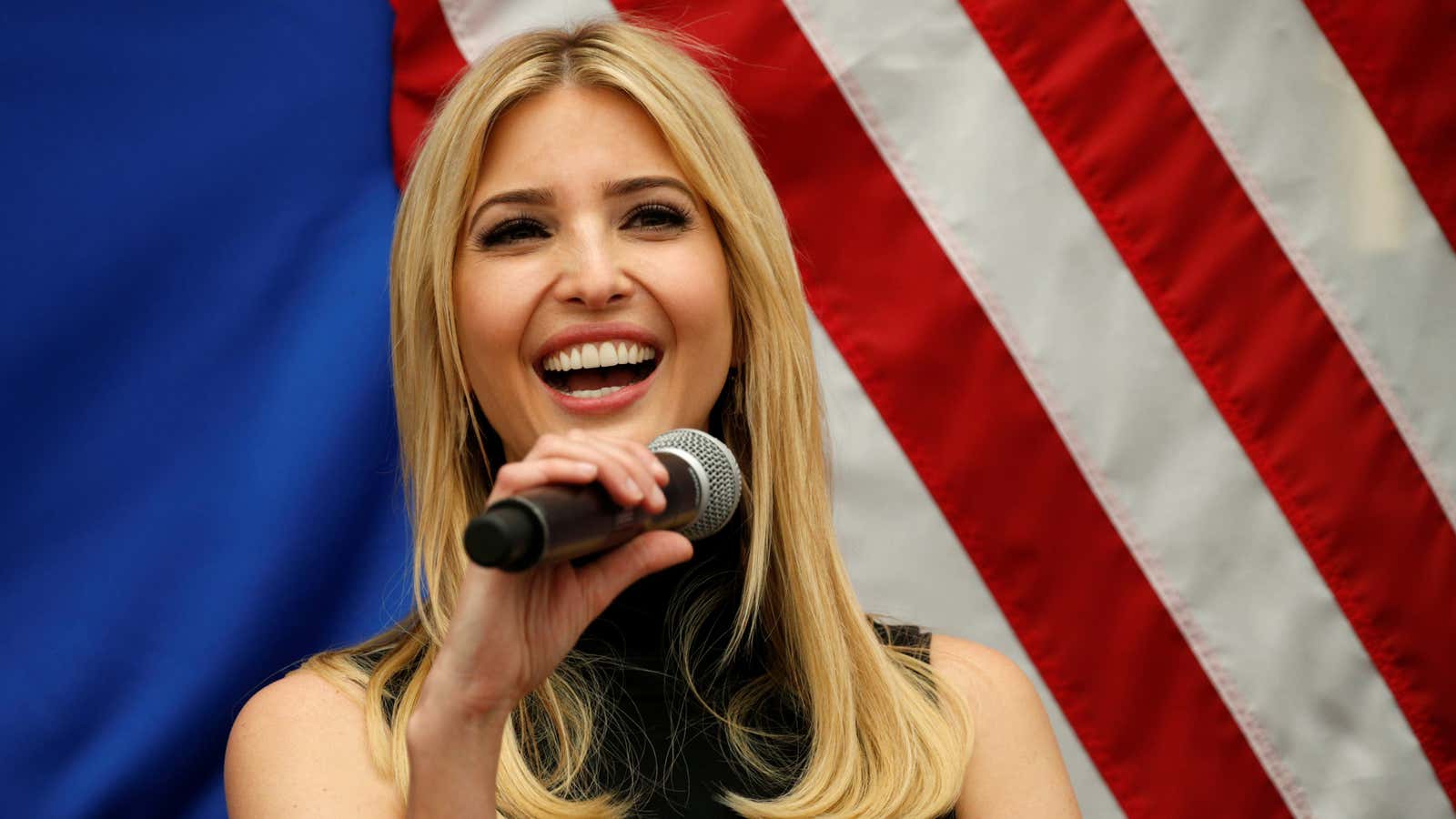Amidst the motley crew of characters that surround US president Donald Trump, his oldest daughter Ivanka has emerged as conservative white America’s dream woman: At only 35, the blonde former model (“a piece of ass,” according to her father), is a hardworking mother of three, a devout wife who converted to orthodox Judaism for her husband, and a businesswoman worth hundreds of millions of dollars. Even liberal commentators have been wowed by her aura of influence, she is an advisor to the president, a bestselling author, a keynote speaker on women’s empowerment and work-life balance, and an advocate for family friendly policies.
Sure, her push to convince her father that the US should stay in the Paris climate agreement failed—something she had discussed with activists like Al Gore and Leonardo di Caprio—but, writes Politico, she and her husband Jared Kushner are “playing the long game, helping the president to be successful. And they don’t tally their own influence day by day or bill by bill.”
It is presumably also this long-term influence that moved CNN to label her—bypassing prominent figures such as supreme court justices Ruth Bader Ginsburg and Elena Kagan, Facebook’s Sheryl Sandberg, and Federal Reserve head Janet Yellen—the most powerful Jewish woman in America. Following the CNN story, Ivanka’s face also graced the cover of Us Weekly, alongside the pronouncement “Why I disagree with my dad.”
But does she? With the exception of supposedly being responsible for adding family leave to Trump’s budget proposal (something that may be hard to sell to Congress), Ivanka’s alleged power has accomplished very few tangible results.
The most powerful brand
The differences between Ivanka and her father are as clear as they are numerous: Her classy demeanor, her Chinese-speaking children, or her statements in support of the LGBT and feminist communities stand in sharp contrast to her dad’s bombastic, unapologetically politically incorrect persona. Where Trump is loud, she is well-mannered; where he is rambling, she is articulate; where he is vulgar, she is likable.
But there is a key way in which she is exactly like him: Ivanka Trump is a master at branding herself. On his father’s name, Donald Trump built an empire; now his daughter is well on her way to do just the same.
Ivanka’s marketing prowess is not exactly a secret, just look at the way she’s branded her clothing line: Her mid-market designs are versatile enough to be sold under a variety of different labels. She sells her unremarkable shoes (made in China in questionable labor conditions) as department-store staples perfect “for the boardroom and beyond,” all the while positioning herself as the modern icon of female rationality and empowerment.
She is also not above using her connections to boost her brand, a strategy some claim is a conflict of interest. In this context, her newfound political prominence is yet another tool that can add reach to her business empire.
Ivanka has already used party conventions and official interviews as product placement opportunities. As a child, she had her house staff chip in to buy her lemonade; today White House advisor Kellyanne Conway famously promoted her clothing line on TV.
Feminism as PR
Ivanka’s official title in the White House is “assistant to the president,” a role that allows her to be a moderate voice in her father’s ear, according to The New York Times. Indeed, she has publicly declared her intention “to act as a moderating force in an administration swept into office by nationalist sentiment.” The Times noted that she is “building bridges” between her father and more moderate conservatives. The Washington Post highlighted Ivanka’s role in getting a family leave policy included in Trump’s budget, saying that she is “expected to play a central role in discussions about how to construct it.”
But while Ivanka may pitch herself as a model of female empowerment, on the campaign trail she failed even to get a strong apology from her father regarding his lewd comments about women. She has also done little, so far, to slow the Trump’s administration intended war on women. (She has used her name to help promote a World Bank fund for women entrepreneurs in developing countries, but this effort pales in comparison to the cuts to UN funding proposed by her father.)
In April, Ivanka travel to Berlin to speak alongside Angela Merkel and Christine Lagarde about women and meritocracy, but she owes her current job—and her husband’s job—to her father. Similar to many contradictory aspects of the Trump brand, nepotism has long been par for the course.
Just like her book Women Who Work, Ivanka Trump ultimately remains more style than substance. She has a fancy cover, but there’s not much happening between the glossy dust jackets. This isn’t to say Ivanka is unintelligent—to the contrary, she’s an incredibly savvy businesswoman and, perhaps, politician. But she also seems to have invested a lot more time and energy into appealing packaging, rather than product. And so far, America seems to be buying it.
